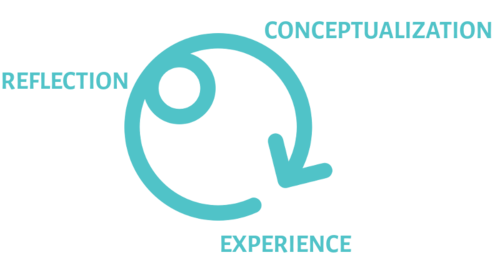Based on the observation that people do not learn like computers, whose progress can be shown as a linear progression, David and Alice Kolb state that a learner has to move through several phases. Applying this curricular model we propose specific definitions for these phases. [1]
Contents
Concrete Experience
1. In the beginning in a phase of concrete experience the challenge will be defined.
Reflective Observation
2. Reflective observation does help to identify if the implemented action lead to success or not.
Abstract Conceptualization
3. From observation and evaluation we generate models of the reality that allow us to define some rules.
Active experimentation
Action, involvement, trial and error help us to apply these new models and to prove them in new experimentation.
And again we start to enter a new circle with new concrete experience.
Learning to Learn
Learning is a circular activity that challenges us in defining the competencies we need to gain most from these often implicit learning processes. Therefore successful learning from a lofe-long perspective is depending from for the individual appropriate learning-to-learn strategies unless most situations are complex, unique and not to be managed with recipes from schoolbooks or though formal advice. We need to strengthen our and our participants' reflective skills and our capacities to act autonomously. [2]
References
- ↑ Kolb, Alice Y.; Kolb David (2005): Learning Styles and Learning Spaces: Enhancing Experiential Learning in Higher Education; in: Academy of Management Learning & Education; Vol. 4, No. 2 (Jun., 2005); pp. 193-212
- ↑ N. Zimmermann: Mentoring Handbook - Providing Systemic Support for Mentees and Their Projects; Berlin 2012; MitOst; ISBN 978-3-944012-00-1
Nils-Eyk Zimmermann
Editor of Competendo. He writes and works on the topics: active citizenship, civil society, digital transformation, non-formal and lifelong learning, capacity building. Coordinator of European projects, in example DIGIT-AL Digital Transformation in Adult Learning for Active Citizenship, DARE network.
Blogs here: Blog: Civil Resilience.
Email: nils.zimmermann@dare-network.eu





